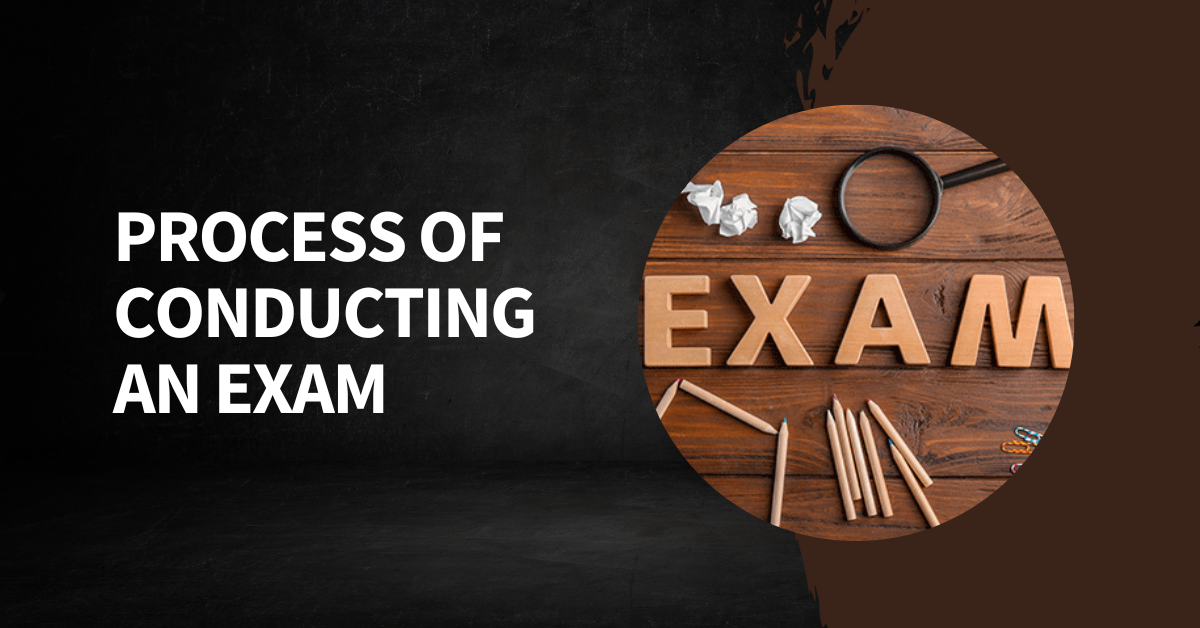
The Intricate Process of Conducting an Exam : A Complete Guide
Conducting an exam is a meticulous procedure that involves various stages and meticulous planning. Whether it’s a school examination, a competitive entrance test, or a certification exam, the process remains fundamentally similar. In this comprehensive guide, we will delve into the intricacies of how exams are conducted, from initial preparation to post-exam procedures. So, fasten your seatbelts as we take you through the journey of the examination process.
Understanding the Significance of Exam Conduct
1.The Foundation of Assessment Exams serve as the cornerstone of evaluating an individual’s knowledge, skills, and aptitude. They play a pivotal role in determining a person’s academic or professional progress.
2.Gateways to Opportunities Success in exams can open doors to various opportunities, such as higher education, career advancements, or even personal growth.
3.Quality Assurance Exam processes are designed to maintain the quality and integrity of assessments, ensuring fairness and consistency.
4.Data Collection Exams generate valuable data that can help institutions and organizations make informed decisions about their curriculum or candidate selection.
Preparation Phase
5. Setting Objectives The first step in conducting an exam is setting clear objectives. Educators or examiners need to define what they want to assess and achieve through the examination.
6. Developing Exam Content The exam content, including questions and topics, must align with the predetermined objectives. This phase involves careful research and selection.
7. Creating a Question Bank Many exams use question banks to ensure a varied and unpredictable set of questions. These banks are regularly updated to maintain the relevance of the exam.
8. Determining Exam Format The format of an exam, whether it’s multiple-choice, essay-based, practical, or a combination, depends on the nature of the assessment.
9. Scheduling Selecting the date and time for the exam is critical to accommodate both examiners and candidates.
Candidate Registration
10. Registration Process Candidates are required to register for the exam, providing essential information such as personal details, identification, and payment of fees.
11. Admit Cards After successful registration, candidates receive admit cards with details about the exam venue, date, time, and other relevant instructions.
12. Verification and Authentication Before the exam day, candidates’ identities are verified to prevent impersonation and cheating.
Conducting the Exam
13. Setting Up Exam Halls Examination centers must be arranged with seating arrangements, proper lighting, ventilation, and surveillance to ensure a conducive environment for candidates.
14. Invigilation Trained invigilators oversee the exam to maintain decorum and to prevent any form of malpractice.
15. Distribution of Question Papers On the day of the exam, question papers are distributed to candidates, ensuring they receive the correct set of questions.
16. Strict Timelines Exams operate on strict timelines, with designated start and end times. Punctuality is crucial.
17. Security Measures Security measures, such as the prohibition of electronic devices, are enforced to maintain the integrity of the exam.
18. Accessibility Exams must be accessible to all candidates, including those with disabilities. Special arrangements are made to accommodate their needs.
19. Supervision Senior staff supervises the entire process to address any unexpected issues or emergencies.
Post-Exam Procedures
20. Collecting Answer Sheets After the exam, answer sheets are collected, and candidates are not allowed to leave until all materials are accounted for.
21. Initial Scanning In some cases, answer sheets are scanned electronically for quick initial evaluation.
22. Answer Key Creation The examiners create an answer key based on predefined correct responses.
23. Grading and Evaluation The painstaking process of grading and evaluation begins, where each candidate’s performance is assessed according to the answer key.
24. Result Compilation Once all the papers are graded, the results are compiled and reviewed for accuracy.
25. Result Publication The results are then published, and candidates are notified of their scores. This information is often made available online.
26. Revaluation and Rechecking Candidates have the option to request revaluation or rechecking of their papers if they believe there has been an error.
Post-Exam Actions
27.Certificates and Diplomas Successful candidates receive certificates or diplomas, marking their achievement.
28.Feedback Gathering Institutions often gather feedback from candidates to improve the examination process.
29.Data Analysis Exam data is analyzed to identify trends and patterns, helping institutions refine their curriculum and teaching methods.
30.Security of Exam Records Exam records and materials are securely stored for a specified period in case of disputes or reevaluations.
Read More :- Best Exam Conducting Agency in India
Conclusion
The process of conducting an exam is a multi-faceted journey that demands meticulous planning, organization, and execution. From the initial stages of setting objectives and developing content to the post-exam actions of result publication and data analysis, every step plays a crucial role in ensuring the fairness and integrity of the examination process. Ultimately, exams serve as valuable tools for assessment and provide individuals with opportunities for growth and advancement in their academic and professional pursuits.


